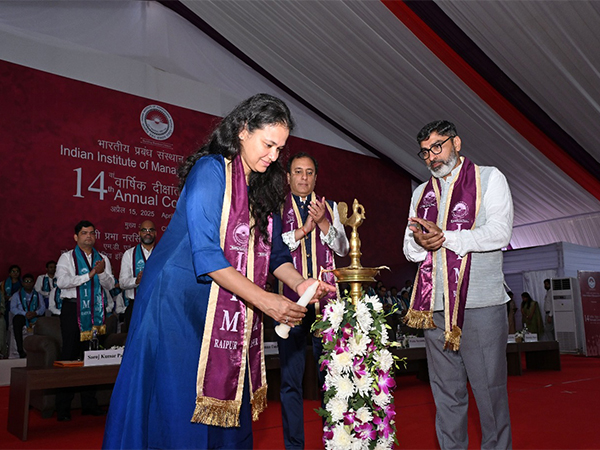G20 delegates in second Environment Climate Sustainability Working Group meeting at Gandhinagar discuss key issues
Mar 28, 2023

New Delhi [India], March 28 : The second day of the 2nd Environment and Climate Sustainability Working Group (ECSWG) meeting commenced at Gandhinagar, Gujarat with the opening remarks by G20 Co-chair for India, Richa Sharma, Additional Secretary, Ministry of Environment, Forest and Climate Change.
Speaking on the occasion, she emphasised the need to collaborate with the G20 countries and engage in an inclusive, consensus-driven approach and actions to address climate change.
She expressed her gratitude to the delegates for their active involvement in the first ECSWG meeting and the Focus Group Discussions between the two working Group meetings on the three thematic priorities.
She reaffirmed India's commitment to facilitate tangible outcomes to build a strong foundation before passing on the baton to the Brazil Presidency.
Acknowledging the work of past Presidencies and the deliberations on the three priorities during the 1st ECSWG, Sharma highlighted the importance of receiving inputs during the technical sessions which would help shape the outcomes for each priority.
She further expressed that consistent and enthusiastic participation from all delegates will greatly facilitate the process of finalizing the draft Communique. The representatives from the Troika (Indonesia and Brazil) echoed the Co-Chair's remarks on the expected outcomes from the G20 India Presidency.
As per the Ministry of Environment, Forest and Climate ChangeThe inaugural session was followed by the first technical session of the day on Water Resource Management, led by Debashree Mukherjee, Special Secretary, of Water Resources, Ministry of Jal Shakti. The presentations made during the session highlighted the need for efficient management of water resources to achieve the overarching UN Sustainable Development Goals and also addressed global water challenges such as climate change, population growth, and increasing water demand.
" Thematic presentations were also made on Namami Gange -an integrated Conservation Mission to accomplish effective abatement of pollution, conservation and rejuvenation of Ganga, climate-resilient infrastructure - water storage/ Dam Rehabilitation and Improvement Project (DRIP), participatory groundwater management, Jal Jeevan mission - a project to provide safe and adequate drinking water by 2024 to all households in rural India, and Swachh Bharat - the project on Universalization of Water Sanitation and Hygiene and its effects. These presentations further corroborated the ever-demanding need for such initiatives to address the depleting level of groundwater at an alarming rate" the ministry added
Ministry of Environment, Forest and Climate Change further said that the focus of the second technical session was on land restoration and sharing of best practices on this topic.
In his opening remarks for the session, Bivash Ranjan, Additional Director General of Forest, Ministry of Environment, Forest and Climate Change highlighted the key inputs collated from the deliberations of the 1st ECSWG, focused group discussions and the written inputs shared by the member countries. The deliberations on the subject were in favour of a collaborative and consensus-driven approach, directed at how the key inputs are being incorporated in the development of the proposed outcomes under the India Presidency.
Further, Bivash Ranjan appreciated the constructive inputs shared and the active participation of the countries in developing the outcomes proposed by the Presidency.
The session saw engaging discussions by the delegates on the two priority landscapes identified under India's Presidency, which are forest fire-impacted areas and mining-affected areas.
Experts representing organisations like the United Nations Convention to Combat Desertification (UNCCD) and the Indian Council of Forestry Research and Education (ICFRE) delivered presentations on the proposed Gandhinagar Implementation Roadmap (GIR) on land restoration in correlation with climate change mitigation and adaptation actions, and draft publications were proposed as a compendium of best practices and development of a knowledge sharing platform respectively.

















